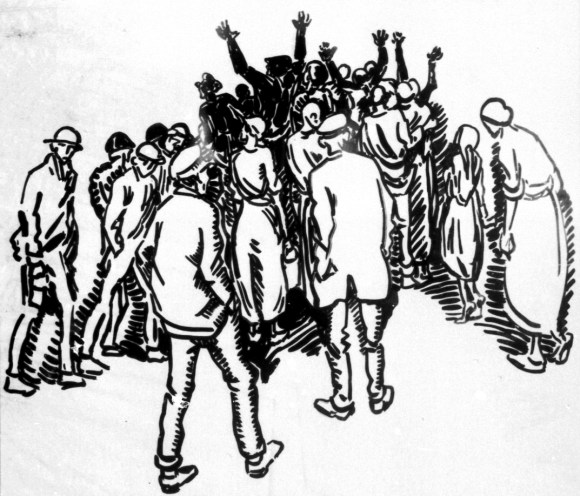
Illustration by Heinrich Vogeler, public domain.
Online harassment and behavioral issues have long been an area of serious concern for the Wikimedia Foundation and particularly for the Community Advocacy team. A major focus of our department is the protection of our users and others impacted by our sites, so we spend a large amount of time thinking about how to support our community in creating safe and inclusive environments.
As our team has been gearing up for several months towards major community conversations and a wide-ranging survey on the issue, a large part of our work has been focused on learning more about online harassment and its solutions. We’re now conducting a first community-wide harassment consultation that already has nineteen proposals (as of publishing time).
In early July 2015, Patrick had the unique opportunity to join a workgroup at the Berkman Center for Internet and Society, focused on misogyny on the internet. Patrick attended this as a representative of the Community Advocacy team; he was invited to discuss how the phenomenon has affected the Wikimedia sites and to share what we have learned about potential approaches to the problem.
The Berkman workshop included a diverse collection of academics, activists, internet experts, and website representatives. Its primary focus was on collective, community-based approaches to a very real and pervasive problem: the treatment of women in online spaces. Victims of abuse had the opportunity to share their experiences, and activists highlighted their challenges in pushing for change. Other topics of the discussions Patrick joined included technical solutions, free-speech concerns, “counterspeech,” legislation, ally training, and techniques used to combat organised harassment campaigns.
From these conversations, it became clear that the internet community needs to stop facing these problems alone or in small groups, and instead use our shared knowledge to collaborate on new approaches.
Patrick was lucky enough to connect with a group of researchers who are trying to collate and summarize the large, cross-discipline body of online harassment research into a more public-friendly literature review. This work in progress can be found on Meta, Wikimedia’s coordination wiki. One of the biggest roadblocks often encountered by people who experience online harassment is that the problem is belittled or denied by commenters. Access to summarized research equips victims with knowledge that will help them cope with the attacks they are suffering and educate those who are sceptical of the gravity of this issue. Too often, people feel alone in having been harassed, or are given well-meaning advice to “just ignore the trolls.” Neither the victims of harassment nor their supporters may be aware of the emerging support groups and platforms for people who experience online harassment. Access to research on internet harassment will let those helping to support victims, as well as those communities in which people are being victimized, approach the problem effectively and construct solutions for their communities.
Patrick has been able to bring his discussions at the Berkman workshop to our collaboration with a group of volunteers from across the Wikimedia projects, exploring new solutions and ideas to address harassment on the sites. This group has already started important conversations within our community. At WikiConference USA earlier this month, Community Advocacy worked with Wikimedia DC and dedicated volunteers to bring in widely respected legal scholar Danielle Citron (see her speech on YouTube), and started dialogue with elected US officials on changes to legislation and law enforcement approaches to online harassment.
This fall, the Community Advocacy team will gather focused data on harassment-related issues experienced on the projects. The team ran a survey, translated into 16 languages, to learn about the ways contributors have experienced harassment and difficult engagements with other users. We are following this survey with an open discussion about these issues with our community in the form of an online consultation.
We hope that this work will lead towards a better understanding of how misanthropy in all its forms—misogyny, racism, xenophobia, and the many other types of hatred some humans harbor for others—manifests in our movement, and how it can be countered.
This problem is not something the Wikimedia movement can fight on its own, though we are very lucky to have a community of dedicated volunteers who care deeply about this issue. Together they are leading efforts to address and reform our culture, but the problem of internet harassment is not limited to our sites and cannot be solved without changes in the world around us.
The Internet community is finally starting to come together in larger conversations, and public recognition of the issue is growing. Now is the time to put all we can into solving this shared problem.
Patrick Earley, Community Advocate
Maggie Dennis, Director of Community Advocacy
Wikimedia Foundation

Can you help us translate this article?
In order for this article to reach as many people as possible we would like your help. Can you translate this article to get the message out?
Start translation